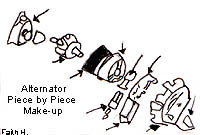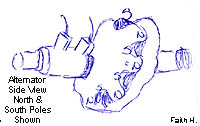St. Mary's High School, Manhasset, NY
|
** Important Disclaimer ** |
||||||
Understanding Alternators
Stacey F.
Karina J. and Faith H.
An alternator, also known as an alternating current (ac) generator, is a type of electric generator. Generators produce electricity. Two physicists named Michael Faraday of England and Joseph Henry of the United States discovered this concept in 1831. The alternator is mostly used in cars. Many people use alternators, car manufacturers, repairmen or anyone dealing with electricity.

The battery is the most important part of the electrical system in the car. Something has to keep feeding the battery, or it will lose voltage and fail to work. This job is left to the charging system is the alternator. It delivers electrical power to the battery and the rest of the cars electrical system.
The alternator uses electromagnetism induction to produce voltage and current. A magnet, called a rotor is turned inside a fixed loop conductor, called a stator, to produce a voltage. The strength and polarity of the voltage is determined by the direction of rotation, the strength of the magnetic field, the number of conductors and the speed of the rotor inside the stator.

The armature coils, or motionless conductors are held in place in slots in the alternator frame. The field coils are wound on poles or slots around the twisting shaft. The assembly that contains the motionless conductors is called the stator. The assembly that includes the twisting poles and field coils is called the rotor. Most alternators use brushes and slip rings on the rotor to pass direct current to the spinning field windings, but some don't use any brushes or slip rings.
Bibliography:
Bordoff, Fred. Charging Systems, America Online: Frumple 7
Dictionary of Cultural Literacy Second Edition. Ed Hirsh, Kett, and Trefil: Haughten Mifflin Company, (America Online), 1993.